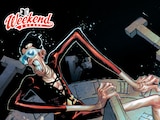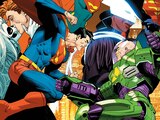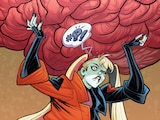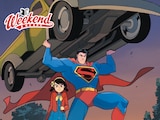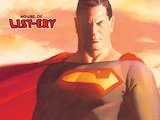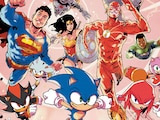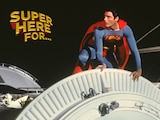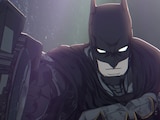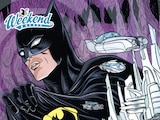SPOILER ALERT: The following feature contains spoilers for Blue Beetle.
Perhaps the darkest truth when it comes to the DC Universe is that it’s full of so many destroyed families. So many superheroes come from shattered families. If you have any doubts, look no further than the pearls scattered on the Crime Alley street, or the empty space where Krypton once orbited. Origin stories are deadly, even for the otherwise upbeat and affable Jaime Reyes, and not every member of the Reyes family makes it out of Blue Beetle alive.
But even with the death of their patriarch Alberto and the destruction of their family home, the Reyes family perseveres. I couldn’t help but compare them to the other family in the film, the Kords. While the Kord family dynamics are not as big of a theme as the Reyes’s, there are still some interesting parallels to consider. For example, is it fair to say that the Kord family has been destroyed? If so, why did they crumble, while the Reyes family survived?

The easy answer is because Jaime Reyes is our hero and Victoria Kord is a villain. That’s all true, but I think we can look deeper here. In fact, I was surprised to find the parallels between the journeys both families take.
Before I dive into that, though, let’s quickly recap the state of both families when we meet them in the film. The Reyes family is made up of Nana, Jaime’s parents Alberto and Rocio, Uncle Rudy, Jaime and his sister Milagro. They’re a close-knit family who all live in the same home, and they’ve worked really hard for their place in life, humble as it is. The family is seldom apart, as demonstrated when they all take Jaime to his interview at Kord Industries.
Now, let’s look at the Kords. When the movie begins, Thomas Kord, the patriarch of the family, is long dead. Ted Kord is missing, and his sister Victoria is running Kord Industries in his absence. Ted’s daughter Jenny has an uncomfortable relationship with her aunt Victoria, which only gets worse as the movie progresses.
The Reyeses may be struggling financially, but their familial relationship is much stronger than the Kords. It should be said that there’s a conversation to be had about how race and culture play into the family dynamics, but I’m probably not be the right author to explore it. Instead, I’m going to look at other aspects, starting with their homes.

The Kord and Reyes family homes offer up an interesting illustration of the differences and similarities between the families. The Reyes family takes pride in their home and are constantly worried about being able to afford it. It’s everything they’ve worked for, it’s the rock on which all that they value has been built, and as a result, the destruction of their home is one of the most devastating scenes of the movie.
If you’ve seen it, you know what I mean. Property damage and outright destruction isn’t exactly rare in superhero blockbusters, but the sequence where the Reyes home is attacked is a gut punch. It’s heart wrenching. It’s difficult to watch.
Contrast that with the Kord estate. The sprawling mansion is in ruins when we see it.
“No one’s been here since I was eight,” Jenny tells us.
This says a lot because she seems to be including herself. Jenny doesn’t have the emotional attachment to her family home that Jaime does. Part of this is due to her financial security. After all, abandoning one house isn’t so hard when you have a summer house, a winter house and a few condos.

But the Kord estate is more than just an extra house. It’s the home Jenny spent the early years of her childhood in. It’s the home where she has all these memories that include her late mother. It’s the last home she lived in with her father before he disappeared. Jenny should feel some emotional attachment. Yet the place is in shambles.
“This house is full of stuff,” she tells Jaime. “Your house is full of love.”
When did things go wrong for the Kord family? According to Jenny, it was probably the death of her grandfather. Thomas Kord built Kord Industries alongside his daughter Victoria. When he passed, the family fractured. Ted Kord inherited the company, which deeply upset Victoria. Before long, she went full super-villain and did everything she could to undo Ted’s legacy.
We don’t know what Victoria was like before her father passed, but I wonder if she would have gone down a different path if he were still around. Her grief over his death, and her anger over temporarily losing the company, don’t justify her villainous actions. However, it does point to a big turning point for the Kord family—everything fell apart when Ted and Victoria’s father died.

This is where the similarities I mention come in. The Reyeses lost their family home and their family patriarch. Sometime before the events of the film, the Kords also lost their family patriarch and Jenny let her family home go into disrepair.
The difference is the Reyes family came out stronger. Now granted, it’s a lot harder to thrive as a family when one of your relatives is a super-villain plotting death and destruction. Maybe the Kords never stood a chance. Sometimes a family isn’t destroyed by death or the loss of a home. Sometimes a family is destroyed from within.
But the Reyeses are still standing, and that’s something to celebrate. Their home is gone, and Alberto is gone, but the family unit is stronger than ever. The community has rallied behind them, Jaime has found his way as Blue Beetle, and thanks to everyone’s help, they’re going to be just fine.
What does it take to destroy a family? When it comes to the Reyes clan, it’s hard to say, because we haven’t seen it yet.
Blue Beetle, directed by Angel Manuel Soto and starring Xolo Maridueña as Jaime Reyes, is now streaming on Max.
Joshua Lapin-Bertone writes about TV, movies and comics for DC.com, is a regular contributor to the Couch Club and writes our monthly Batman column, "Gotham Gazette." Follow him on Twitter at @TBUJosh.
NOTE: The views and opinions expressed in this feature are solely those of Joshua Lapin-Bertone and do not necessarily reflect those of DC Entertainment or Warner Bros., nor should they be read as confirmation or denial of future DC plans.

